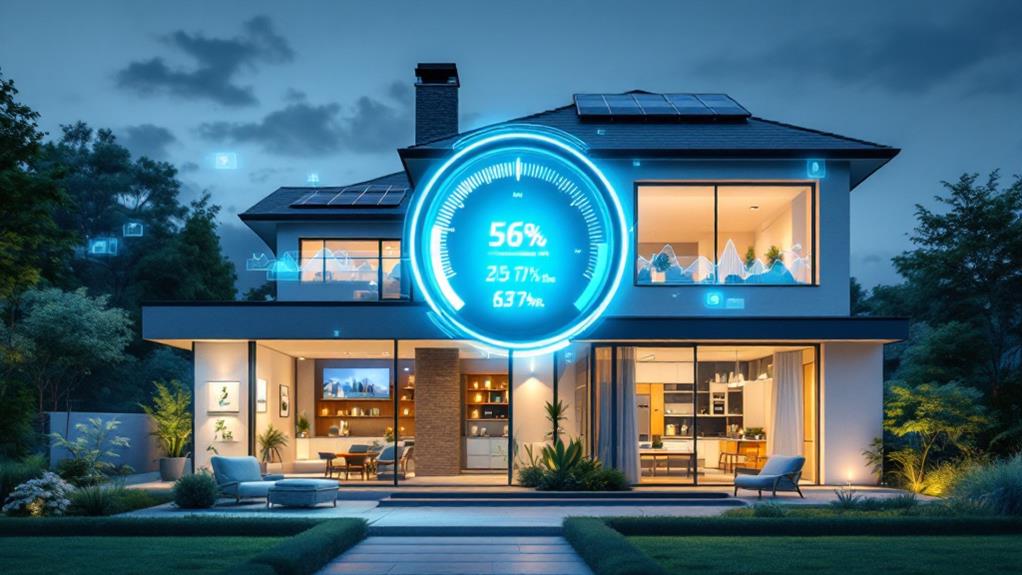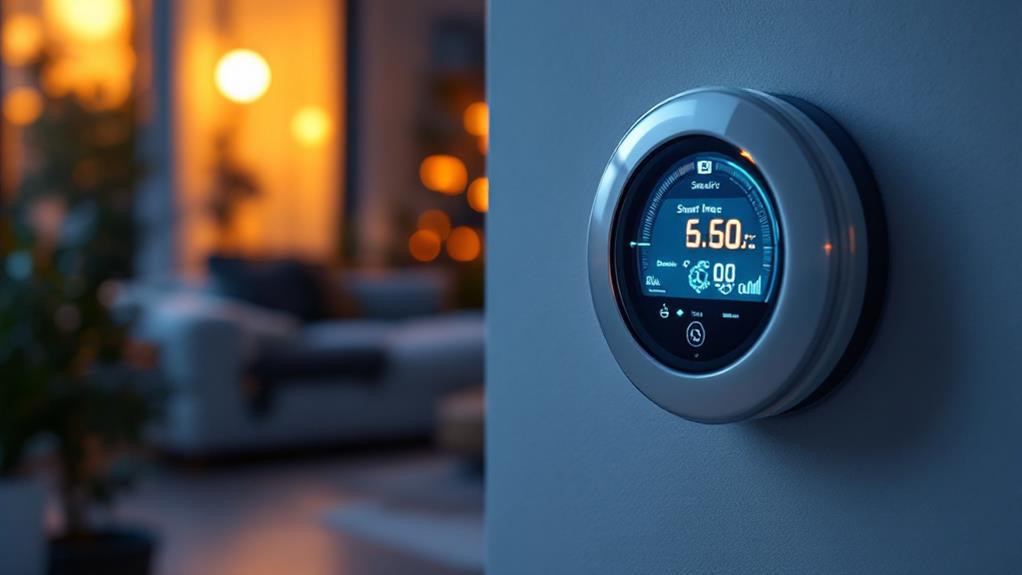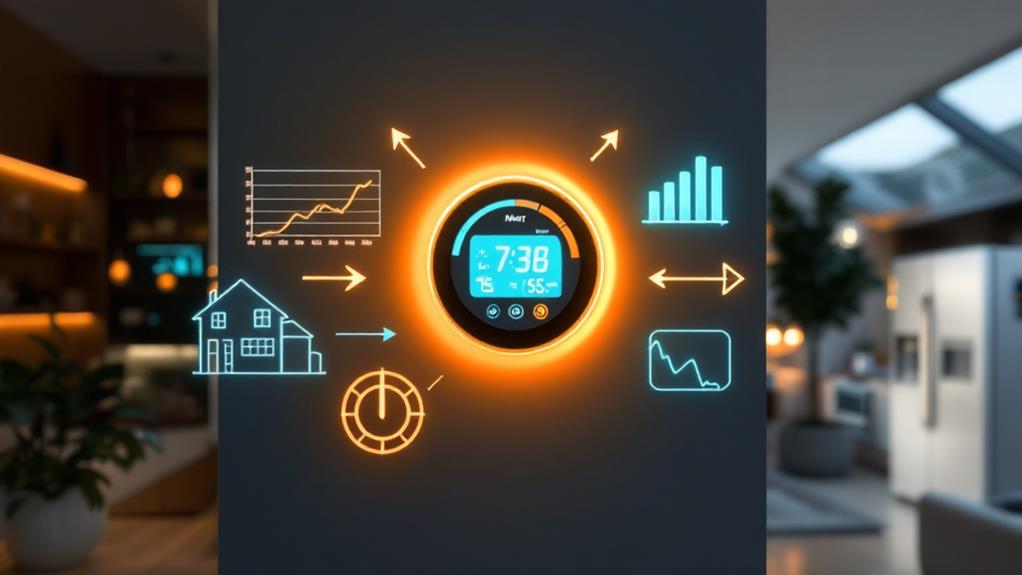
The Impact of Smart Meters on Home Energy Consumption
Smart meters have a profound impact on home energy consumption by introducing real-time data capabilities that promote efficiency and informed usage. Data from Great Britain reveals smart meters lead to average electricity savings of 3.4% and a 3.0% reduction in gas usage by enhancing consumer awareness through In-Home Displays (IHD). This real-time data allows homeowners to identify and amend inefficient consumption patterns. With 57% smart meter penetration, projections indicate further increased usage, driving more substantial environmental benefits and grid stability. Increased consumer engagement and understanding are essential for maximizing these benefits, pointing to promising advancements in smart metering technology.
Key Takeaways
- Smart meters enable a 3.4% reduction in electricity and 3.0% in gas consumption through real-time feedback.
- In-Home Displays (IHD) provide immediate consumption data, promoting informed energy usage decisions.
- Smart meters improve billing accuracy by eliminating estimated charges and enhancing transparency.
- Real-time monitoring helps consumers shift usage to off-peak times, optimizing energy consumption patterns.
- Privacy concerns and data interpretation challenges can limit the effectiveness of smart meters.
Understanding Smart Meters
Smart meters have revolutionized the way energy consumption is monitored and managed, fundamentally transforming the relationship between consumers and energy suppliers. At the core of smart meter technology is the ability to measure and transmit gas and electricity usage data automatically every 30 minutes, markedly enhancing energy efficiency. This feature allows for precise billing, reducing reliance on estimated charges and fostering a more transparent billing process.
The widespread adoption of smart meters is evident, with 32.4 million units installed in Great Britain by March 30, 2023, representing 57% of all meters in the UK.
An essential component of smart meter technology is the In-Home Display (IHD), which provides real-time data on energy consumption. This empowers users to monitor their spending and identify patterns in energy usage, promoting energy efficiency by encouraging behavioral changes that reduce waste.
Government initiatives aim to further increase smart meter penetration, targeting 74.5% of homes and 69% of small businesses by the end of 2025. The installation of smart meters is conducted at no upfront cost to consumers, as energy suppliers recover installation expenses through energy bills, facilitating accessibility and supporting broader energy management goals.
Measuring Energy Usage
Smart meters, which are installed in 57% of homes in Great Britain, provide real-time energy monitoring by recording usage data every 30 minutes.
This granular data enables consumers to gain precise insights into their consumption patterns, aiding in the identification of inefficiencies.
With electricity and gas savings averaging 3.4% and 3.0% respectively, these meters facilitate informed decisions that promote energy efficiency and support the integration of renewable sources.
Real-Time Energy Monitoring
How effectively can real-time energy monitoring reshape household energy consumption patterns? The integration of smart meters has greatly heightened user behavior and energy awareness. With 32.4 million smart meters installed across Great Britain, these devices offer a granular view of energy usage by measuring consumption every 30 minutes. This level of detail enables households to detect patterns in energy use that were previously obscured, leading to informed decisions and behavioral adjustments.
In-Home Displays (IHD) play a pivotal role by presenting real-time energy spending data, which directly influences user behavior. The heightened energy awareness fostered by these displays has resulted in average electricity savings of 3.4% and gas savings of 3.0%. These savings underscore the potential of real-time feedback to drive considerable behavioral changes.
The following table presents key statistics related to smart meters:
| Metric | Value |
|---|---|
| Smart meters installed | 32.4 million |
| Percentage of total meters | 57% |
| Electricity savings | 3.4% |
| Gas savings | 3.0% |
| Monitoring frequency | Every 30 minutes |
Data-Driven Usage Insights
The advent of smart meters marks a significant advancement in the granularity of data available to consumers, offering substantial insights into energy usage patterns at 30-minute intervals. This detailed data collection facilitates a deeper understanding of household energy consumption, enabling consumers to identify specific usage patterns and adjust behaviors accordingly.
In the UK, with 32.4 million smart meters installed as of March 30, 2023, representing 57% of all gas and electricity meters, the data trends emerging from these devices are invaluable for both consumers and energy providers.
Smart meters, coupled with In-Home Displays (IHDs), empower users to monitor real-time energy expenditure, fostering greater awareness and promoting efficiency. Studies indicate a 3.4% reduction in electricity use and a 3.0% reduction in gas consumption, attributed to behavioral changes informed by these insights.
The granular data trends enable users to analyze peak usage times and adjust their consumption to off-peak periods, optimizing energy use. Additionally, smart meters are instrumental in shifting to a flexible energy grid, supporting renewable integration and improving grid stability.
Through precise measurement and feedback, smart meters play a pivotal role in driving energy efficiency and sustainability.
Real-Time Data Benefits
Access to real-time data through smart meters offers significant advantages in managing home energy consumption. By providing data every 30 minutes, these devices employ feedback mechanisms that empower consumers to monitor and adjust their energy usage instantly. With In-Home Displays (IHDs) showing real-time spending, users gain a clear understanding of their energy costs as they occur. This immediate visibility fosters consumer empowerment, encouraging a shift toward more efficient energy behaviors. Studies show an average electricity saving of 3.4% and a gas saving of 3.0% when consumers have access to real-time feedback, highlighting the tangible benefits of these systems.
The following table illustrates the impact of smart meters on energy consumption:
| Metric | Electricity Savings | Gas Savings |
|---|---|---|
| Real-Time Feedback | 3.4% | 3.0% |
| Behavioral Change | Encouraged | Encouraged |
| Consumer Empowerment | Enhanced | Enhanced |
Furthermore, smart meters facilitate the integration of renewable energy sources and enhance grid flexibility by managing energy resources based on real-time demand insights. This capability not only improves energy efficiency but also supports sustainable energy practices. Overall, real-time data from smart meters is a critical component in optimizing home energy consumption and contributing to broader environmental goals.
Adoption Rates in the UK
As of March 2023, smart meters constituted 57% of gas and electricity meters in Great Britain, with installations reaching 32.4 million.
The UK government has set ambitious adoption targets, aiming for 74.5% of homes and 69% of small businesses to have smart meters by the end of 2025.
Installation trends indicate a steady increase, with projections suggesting smart meter coverage will surpass 60% by the end of 2023, driven by policy requirements and accessibility to broader demographics, including renters and pre-payment customers.
Smart Meter Coverage
Smart meter adoption in the UK has reached a pivotal stage, with 32.4 million installations accounting for 57% of all gas and electricity meters by March 30, 2023. This significant coverage underscores both the benefits and challenges of smart meter integration.
On one hand, smart meter benefits include enhanced energy efficiency and more accurate billing, contributing to consumer empowerment and facilitating the shift to a low-carbon economy. On the other hand, smart meter challenges such as data privacy concerns and technological interoperability must be addressed to guarantee widespread acceptance.
The UK government’s ambitious target to equip 74.5% of homes and 69% of small businesses with smart meters by the end of 2025 highlights the strategic importance placed on this initiative.
As of the end of 2023, projections indicate that over 60% of meters will be smart meters, marking a gradual yet steady increase in adoption rates. Energy suppliers are under a mandate to offer smart meters within 18 months of a request, ensuring that the rollout pace aligns with regulatory expectations.
Additionally, existing smart meter users may require replacements by mid-2025, necessitating compliance with updated regulations and maintaining system integrity.
Installation Progress Trends
The adoption trajectory of smart meters in the UK demonstrates a consistent upward trend, as evidenced by the installation of 32.4 million smart meters by March 30, 2023, which accounts for 57% of all gas and electricity meters. This growth is part of the Smart Meter Rollout Programme, which aims to improve energy management and efficiency nationwide.
Despite the progress, installation barriers persist, primarily stemming from logistical challenges and consumer perceptions. Logistical issues include the availability of skilled technicians and the complexity of integrating smart meters into existing infrastructure.
Consumer perceptions play a vital role in adoption rates. Some consumers express concerns regarding data privacy and potential disruptions during the installation process. Additionally, there is a subset of consumers who remain skeptical about the benefits of smart meters, which can slow down adoption.
However, projections indicate a positive trajectory, with over 60% of meters expected to be smart meters by the end of 2023. Energy suppliers are required to offer smart meters to customers within 18 months if not yet installed, which should further mitigate some of these barriers.
As these challenges are addressed, the UK is poised to reach its future adoption targets efficiently.
Adoption Target Goals
How significant is the role of smart meters in achieving the UK’s energy efficiency goals? As of March 2023, smart meters constituted 57% of all gas and electricity meters in Great Britain, with 32.4 million installations. The UK government has set ambitious targets, aiming for 74.5% of homes and 69% of small businesses to have smart meters by the end of 2025. This trajectory underscores the critical role smart meters play in reducing energy consumption and enhancing efficiency.
However, adoption barriers persist, fueled by consumer perceptions regarding privacy, data security, and perceived complexity of use. Such concerns can impede progress towards achieving these targets. Projections indicate that by the end of 2023, over 60% of meters in Great Britain will be smart, suggesting a positive trend but also highlighting the need for ongoing efforts to overcome these barriers.
Energy suppliers are expected to offer smart meters to customers within 18 months of the rollout, which may help in mitigating some adoption obstacles.
Additionally, existing smart meter users may face challenges, as their devices may require replacement by mid-2025 to comply with updated regulations, further impacting the overall adoption rate and associated energy efficiency objectives.
Energy Savings Statistics

Recent data on energy savings underscores the tangible benefits of smart meter implementation in residential settings. The adoption of smart meters has resulted in an average electricity savings of 3.4% and a 3.0% reduction in gas consumption. These savings are substantial when considering the scale of household energy use.
The key driver behind these reductions is the enhancement of consumer awareness and energy efficiency, facilitated by real-time energy feedback. This feedback mechanism empowers consumers, fostering a greater understanding of their consumption patterns which, in turn, promotes energy-efficient behaviors.
Moreover, smart meters guarantee accurate billing, which plays an essential role in reinforcing consumer awareness. This accuracy eliminates estimation discrepancies, allowing consumers to perceive the direct impact of their energy habits on costs.
A thorough review of studies has confirmed the effectiveness of smart meters in reducing energy consumption, with statistically significant results (p-values less than 0.001), affirming the reliability of these findings.
Government support for the widespread adoption of smart meters highlights their significance in promoting energy efficiency and achieving financial benefits for consumers. By enhancing energy awareness and optimizing consumption, smart meters represent an indispensable tool in the shift towards more sustainable energy use in households.
Behavioral Changes Observed
The implementation of smart meters has been shown to induce significant behavioral changes in household energy consumption patterns, with an average reduction of 3.4% in electricity and 3.0% in gas usage attributed to increased consumer awareness facilitated by real-time energy feedback.
In-Home Displays (IHD) play an essential role by providing users with immediate data on energy usage and costs, thereby encouraging more conscious energy consumption decisions.
In addition, meta-analytical evidence from seven studies confirms the effectiveness of smart meters in promoting energy use alterations, yet highlights the need for strategies that sustain long-term engagement with energy feedback for continued behavior modification.
Energy Use Alterations
Smart meters have instigated measurable changes in consumer energy behaviors, with data indicating an average electricity saving of 3.4% and gas savings of 3.0%.
These savings are primarily driven by enhanced consumer engagement facilitated through real-time usage feedback. The provision of instant data allows consumers to become more aware of their energy consumption, prompting them to make informed decisions about reducing unnecessary usage. In-Home Displays (IHDs) have been pivotal in reinforcing these behaviors, offering a visual representation of energy expenditures that encourages conscientious energy habits.
Despite these positive trends, the overall reduction in energy usage since the rollout of smart meters is only about 2%. This discrepancy underscores the importance of how consumers interpret smart meter data and their motivation to modify consumption patterns. The effectiveness of smart meters depends greatly on consumer willingness to adapt their habits based on the feedback provided.
To highlight the impact of smart meters on consumer behavior, consider:
- 3.4% average electricity savings – a proof of increased consumer awareness.
- 3.0% gas savings – demonstrating potential for reducing environmental footprints.
- Increased consumer engagement – spurred by real-time feedback, indicating a shift towards more sustainable living.
Consumption Pattern Shifts
Energy consumption patterns have undergone significant shifts due to the implementation of smart meters, as evidenced by measurable changes in consumer behavior. Empirical data highlights an average electricity saving of 3.4% and gas savings of 3.0%, attributed to the feedback on energy usage provided by smart meters.
The real-time data facilitated through in-home displays proves instrumental in altering user behavior by making consumption patterns more transparent. This transparency enhances consumer engagement, leading to informed decisions that favor energy efficiency.
The availability of immediate feedback has been shown to increase consumer awareness regarding their energy usage, enabling users to adjust their habits accordingly. This effect is supported by studies indicating that smart meters play an essential role in promoting a culture of energy conservation within households.
However, it is important to note that some users may experience a decline in interest after the initial novelty of the technology fades. This suggests that sustained consumer engagement is critical for maintaining long-term behavioral changes.
Government initiatives underscore the significance of smart meters in domestic energy consumption reduction, aligning with sustainability targets. The cumulative impact of these behavioral shifts contributes to broader environmental goals, emphasizing the transformative potential of smart meters.
Billing Accuracy Improvements

Accurate billing represents a significant advancement in energy management, driven by the widespread adoption of smart meters. By eliminating estimated charges, smart meters provide accurate, real-time readings, enhancing billing transparency and fostering consumer trust. This precision guarantees that consumers are only charged for the energy they actually consume, reducing disputes and potential overcharges.
The average savings of 3.4% in electricity and 3.0% in gas underscore the financial benefits directly linked to improved billing accuracy. This not only enhances consumer confidence in their energy supplier but also encourages more informed and efficient energy use.
Smart meters’ impact is further evidenced by the installation of 32.4 million units across Great Britain, covering 57% of all gas and electricity meters. This widespread adoption signifies a collective move towards precision in billing and consumer empowerment.
The benefits extend beyond individual savings, as more accurate billing can lead to broader behavioral changes, fostering greater energy conservation.
- Reduced Financial Stress: Consumers no longer face unexpected high bills based on estimations.
- Enhanced Energy Awareness: Accurate billing encourages mindful energy use.
- Increased Consumer Satisfaction: Trust in energy providers grows with transparent billing practices.
These improvements mark a critical step in modernizing energy consumption management.
Research and Methodology
Building on the financial advantages and consumer empowerment facilitated by smart meters, a rigorous examination of their impact on home energy consumption was undertaken. Commissioned by the Department for Energy Security & Net Zero in January 2022, this research involved an extensive evidence review focusing on ten major domestic energy suppliers. The review framework was meticulously developed to filter and assess the robustness of individual studies before proceeding to a formal meta-analysis. Through this structured approach, statistically significant results were achieved, with p-values less than 0.001, providing compelling evidence of energy savings linked to smart meter implementation.
A critical component of this research was synthesizing evidence from seven studies across four suppliers. However, study limitations, such as variations in data quality and methodologies, were acknowledged. Data interpretation was essential in deriving meaningful conclusions from the diverse datasets.
| Aspect | Details |
|---|---|
| Commissioned by | Dept. for Energy Security & Net Zero |
| Review focus | 10 largest domestic energy suppliers |
| Studies analyzed | 7 studies across 4 suppliers |
| Statistical results | Significant with p-values < 0.001 |
| Key limitation | Variations in data quality and methodologies |
Key Study Findings

In a thorough analysis of smart meter implementation, the meta-analysis of seven studies from four major energy suppliers revealed statistically significant reductions in home energy consumption, with p-values less than 0.001. This compelling evidence underscores the smart meter benefits in enhancing energy efficiency.
On average, households experienced a 3.4% reduction in electricity usage and a 3.0% decrease in gas consumption. Prepay meters, however, exhibited a modest savings of 0.5%. Such reductions are primarily attributed to behavioral modifications facilitated by real-time energy consumption feedback, fostering heightened consumer awareness and more accurate billing.
The Behavioural Insights Team’s evidence synthesis further elucidated that smart meters drive proactive energy-saving behaviors. This aligns with the strategic goal of optimizing energy use, making a compelling case for sustained investment in smart meter technology.
By fostering informed energy decisions, smart meters are essential in the journey towards a sustainable energy ecosystem.
The key findings evoke a profound response:
- 3.4% Electricity Savings: Tangible financial relief for households.
- Proactive Behavior: Empowering consumers to control their energy footprint.
- Smart Meter Adoption: A vital step towards energy efficiency and sustainability.
These findings emphasize the transformative potential of smart meters in achieving energy efficiency.
Grid Flexibility Enhancement
Grid flexibility represents an essential dimension in modern energy management, enhanced considerably by the deployment of smart meters. These devices facilitate real-time monitoring of energy consumption, thereby optimizing the balance between grid demand and supply. The integration of smart meters supports the shift to a more adaptable energy grid, vital for integrating variable renewable energy sources such as wind and solar. Through precise usage data, consumers are empowered to modify their energy use during off-peak times, alleviating grid stress during peak periods and improving overall energy efficiency.
Smart meters are integral to demand response programs, enabling utilities to adjust energy distribution dynamically based on real-time consumption patterns. In Great Britain, with over 32.4 million smart meters installed, their widespread adoption is significant for enhancing grid operations and energy efficiency. The data collected helps utilities forecast grid demand more accurately and implement strategies that guarantee a stable and reliable energy supply.
| Aspect | Impact on Grid Flexibility |
|---|---|
| Real-time Monitoring | Enhanced grid demand management |
| Renewable Integration | Supports variable energy sources |
| Usage Data | Enables off-peak energy shifts |
| Demand Response | Facilitates adaptive energy distribution |
| Adoption in Great Britain | Optimizes energy efficiency |
This technological advancement underscores the essential role of smart meters in creating a resilient and efficient energy grid.
Challenges in Implementation

Implementing smart meters across households presents several challenges that hinder their full potential in reducing energy consumption. Despite the initial enthusiasm, research highlights the necessity of consumer education and ongoing engagement strategies. Findings indicate a mere 2% reduction in overall energy usage, suggesting that motivational factors and awareness campaigns are essential for sustained consumer interest.
The variability in homeowner responses underscores the need for personalized feedback mechanisms to enhance information clarity and drive behavioral change. User confusion remains a significant barrier, with many struggling to interpret smart meter data and accompanying apps.
Design improvements are essential to create clearer visuals and more user-friendly interfaces. This user confusion can detract from the perceived benefits of smart meters, limiting their impact on energy conservation efforts.
To evoke awareness of these challenges, consider the following:
- Only 2% Energy Reduction: A stark reminder of the current limitations in achieving significant energy savings.
- Widespread User Confusion: Reflects the urgent need for improved design and information clarity.
- Vital Role of Consumer Education: Highlights the necessity of ongoing support and awareness campaigns to maintain engagement with energy-saving technologies.
These challenges necessitate strategic interventions to maximize the effectiveness of smart meters in energy consumption reduction.
User Engagement Strategies
Addressing the challenges in smart meter implementation offers a pathway to explore user engagement strategies that can enhance energy efficiency. Real-time feedback mechanisms, such as In-Home Displays (IHDs), serve as effective engagement techniques by increasing usage awareness. These digital tools provide consumers with instantaneous data, enabling informed decision-making and fostering energy-saving behaviors.
Studies demonstrate that smart meters can induce behavioral nudges, resulting in average savings of 3.4% for electricity and 3.0% for gas, underscoring their potential to drive significant energy efficiency improvements.
Consumer incentives, such as personalized strategies and time-of-use tariffs, further enhance engagement by motivating users to reduce consumption during peak times. These incentives are essential in promoting behavioral shifts necessary for optimizing energy management.
However, despite a decade of rollout, educational initiatives remain important, as research indicates limited consumer awareness of energy efficiency strategies. Effective communication can bridge this knowledge gap, ensuring consumers understand the benefits of smart meters.
Ongoing user support is critical, with mobile apps offering accessible resources that track energy usage patterns. These digital tools facilitate long-term engagement, enabling consumers to continuously refine their energy consumption practices, thereby maximizing the efficacy of smart meters.
Future of Smart Metering

The future of smart metering is poised to transform energy management by advancing the integration of digital technology within the energy sector. By the end of 2025, 74.5% of homes and 69% of small businesses in Great Britain are projected to have smart meters. This widespread adoption is essential for the smart grid, enabling energy progression by optimizing renewable energy integration.
The current trajectory, marked by the installation of over 32.4 million smart meters, underscores the technological advancements driving energy efficiency and consumer awareness.
- Economic Savings: Smart meters yield immediate energy savings of 3.4% in electricity and 3.0% in gas, translating to substantial cost reductions for consumers.
- Environmental Impact: By facilitating better energy management, smart meters support sustainability initiatives and reduce carbon footprints.
- Regulatory Compliance: Adhering to regulatory frameworks, smart meters are vital for meeting government energy targets and enhancing market trends.
The shift towards smart metering aligns with broader digital integration efforts, bolstering the energy sector’s adaptability.
Ongoing investments and positive empirical evidence reinforce the strategic importance of smart meters in achieving a sustainable and efficient energy future. As regulatory frameworks evolve, smart metering will continue to play a pivotal role in shaping energy landscapes globally.
Frequently Asked Questions
Do Smart Meters Reduce Energy Consumption?
Smart meters reduce energy consumption by an average of 3.4% for electricity and 3.0% for gas. This reduction is primarily driven by energy efficiency improvements and behavioral changes, supported by real-time usage feedback, as statistically validated by significant evidence.
What Is the Downside of a Smart Meter?
Smart meters present challenges, particularly regarding privacy concerns and data security. Unauthorized access to detailed consumption data poses risks, while user dissatisfaction arises from mandatory installation, potential billing discrepancies, and difficulties interpreting data, hindering ideal energy usage management.
Do Smart Meters Lead to Higher Bills?
Smart meters generally do not lead to higher bills. Instead, they offer bill transparency and empower consumers with detailed consumption data, facilitating energy-saving behaviors. Initial perceived increases often result from heightened awareness rather than actual usage changes.
Is Energy More Expensive With a Smart Meter?
Energy pricing comparison reveals that smart meters do not inherently increase costs. Instead, smart meter advantages include precise billing and real-time data access, facilitating energy efficiency and enabling consumers to leverage lower time-of-use rates, potentially reducing expenses.
Conclusion
The deployment of smart meters greatly influences home energy consumption by providing precise energy usage measurements and real-time data benefits. Increased adoption rates in the UK correlate with notable energy savings and enhanced grid flexibility. Despite challenges in implementation, effective user engagement strategies can further optimize these benefits. Future advancements in smart metering promise continued improvements in energy management and efficiency, underscoring the importance of addressing existing barriers to maximize the potential of this technology.



Leave a Reply